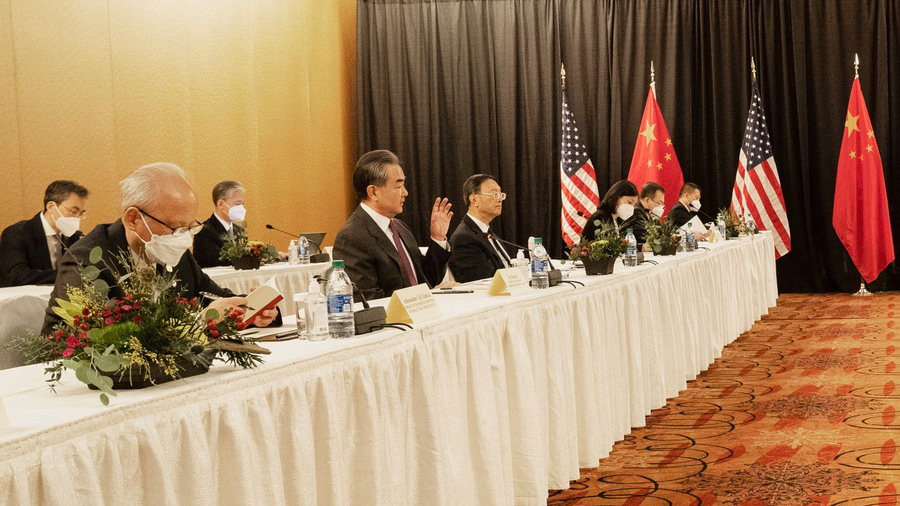Editor's note: Daryl Guppy is an international financial technical analysis expert. He appears regularly on CNBC Asia and is known as "The Chart Man." He is a national board member of the Australia China Business Council. The article reflects the author's opinions and not necessarily the views of CGTN.
My youth was dominated by the war in Vietnam. The media carried war-like language and the language of war was used by the United States and by North and South Vietnam governments. I read as widely as possible, trying to sift truth from the propaganda, from the unbalanced reporting and the outright lies fed to the public.
The meeting between the U.S. and China in Anchorage resonates with this Vietnam-era past repeating the same propensity to use misinformation to justify a conflict. It appears the same officials are duped yet again into another conflict. Wiser heads are swamped by a media that does not question the assumptions and alleged 'facts,' and by politicians eager to be friends with the biggest bully in the room.
Slowing this juggernaut's progress towards conflict requires carefully considered action and carries greater risks than those associated with meek compliance. In Australia, Treasurer Josh Frydenberg demanded Australian business leaders support government policies over China because not to do so was against Australia's interests.
The Anchorage meeting fits into a well-established framework to "cry 'havoc' and let slip the dogs of war.”
In 1971 Daniel Ellsberg published the Pentagon Papers. They confirmed the U.S. government had lied about the reasons for the Vietnam War, its meddling in the progress of the war, and many of the activities, some of which like the use of the defoliant Agent Orange would now be classed as war crimes.
Forty years later, Chelsea Manning teamed up with Julian Assange to make public documents that underpinned the false Weapons of Mass Destruction campaign that was the foundation of the attack on Iraq. The methods used in these Weapons of Mass Deception campaigns – the farrago of misinformation based on 'need to know' security analysis, the seduction of media and political leaders – followed the same playbook exposed in the Pentagon Papers and used again in Anchorage.
It would be hoped leaders and the media had learned something from these disasters. Coverage of the Anchorage meetings suggests they have not. Many headlines and excerpts were not a fair coverage of the content or tone of the meeting.
It takes time to sift through the full transcripts to build an accurate picture of this seminal meeting. It's an important task that we have every right to expect can be outsourced to an objective media, but like Vietnam and Iraq, much of the media advances the cause of conflict. We would expect that sound analysis by governments would lead to better decision making, but that assumes governments, and in particular, the United States, are committed to a peaceful resolution of problems.
That is a doubtful assumption.
Speaking recently during his regular Sunday school lesson at the Baptist Church in Plains, Georgia, former President Jimmy Carter described the U.S. as 'the most warlike nation in the history of the world. This was a result of the U.S. forcing other countries to "adopt our American principles." It's a conclusion that is remarkably similar to comments by the Director Yang Jiechi from the Central Foreign Affairs Commission.

Yang Jiechi (3rd L), a member of the Political Bureau of the Communist Party of China (CPC) Central Committee and director of the Office of the Foreign Affairs Commission of the CPC Central Committee, and Chinese State Councilor and Foreign Minister Wang Yi (2nd L) at the strategic dialogue between China and the U.S., in Anchorage, Alaska, March 18, 2021. /Chinese Foreign Ministry
Yang Jiechi (3rd L), a member of the Political Bureau of the Communist Party of China (CPC) Central Committee and director of the Office of the Foreign Affairs Commission of the CPC Central Committee, and Chinese State Councilor and Foreign Minister Wang Yi (2nd L) at the strategic dialogue between China and the U.S., in Anchorage, Alaska, March 18, 2021. /Chinese Foreign Ministry
In its 245 years as a nation, the U.S. has been at peace for only 16 years, and five of those years were during Carter's presidency. By way of contrast, China has not been at war since the 1980s.
Carter asserted that much of China's success was due to its peaceful foreign policy. China's peace dividend has enhanced its economic growth whilst the U.S. allocated around $5.9 trillion to destructive conflicts since 2001.
The language of Anchorage and the language of reporting in Western media satisfied the conflict narratives crafted by the Trump administration and accepted by the Biden presidency. The constant repetition of a threat narrative precludes co-operation. It predicates compulsion and, failing compliance, conflict. As Ellsberg and Assange show, the consistent compulsion to interfere underpins this history of aggression.
It's a difficult trajectory to counter or alter. More objective reporting of events like Anchorage is a starting point. The exposure of the falsehoods that underpin the threat narratives promoted by political leaders and their savants is the heavy burden of responsibility carried by a free press.
Unlike the Vietnam War period, the middle powers in our region are stronger and more united in organisations like ASEAN and APEC. They are bound together with trade agreements including RCEP and the CPTPP. These are the foundations of the global rule-based order supposedly backed by the U.S. and its allies.
My concerns were personal in the 1960s and are still personal now. In my youth I was old enough to be conscripted but too young to vote. Now I am too old to be conscripted but old enough to be concerned about the impact on my Australian-Chinese grandchildren. More than fifty years later I did not expect to again find myself on the other side of government policy.
(If you want to contribute and have specific expertise, please contact us at opinions@cgtn.com.)

